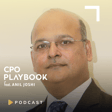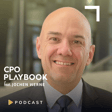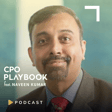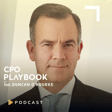Introduction to CPO Playbook and Managerial Challenges
00:00:01
Speaker
I'm Felicia Shakiba, and this is CPO Playbook, where we solve a business challenge in every episode.
00:00:15
Speaker
60% of new managers fail within the first 24 months in their new role, according to research from CEB Global. The phenomenon of high failure rates among new managers is particularly pronounced in individuals from technical backgrounds such as scientists, engineers, or business intelligence analysts.
00:00:35
Speaker
who may have less experience with soft skills. Adequate preparation for these transitions can mitigate these challenges, saving organizations time and facilitating quicker trust building between new managers and their teams. This ultimately leads to enhanced productivity as teams sync up faster.
Alessandro's Career Journey and Role at Valentino
00:00:53
Speaker
Our guest today will share his incredible journey from individual contributor to manager to now the head of business intelligence and planning transformation initiatives at the Italian luxury fashion house, Valentino. Please welcome Alessandro Petruno from Milan, Italy. Alessandro, thank you so much for being with me today.
00:01:16
Speaker
Hi Felicia, thank you so much to you. It's a really pleasure to be with you today. Let me also wish happy St. Valentine's Day to all ours and a happy birthday to my mother whose birthday is today.
00:01:30
Speaker
and happy Valentine's Day to you as well. And it's so nice to have you here on this special day. And so Alessandro, my first question I'd love to ask you is if you could provide some background on the Valentino organization and your role.
00:01:48
Speaker
Okay, sure, sure. But Valentino is an Italian luxury patient house with more than 4,000 employees worldwide. It generates around $1.5 billion in revenues and in almost 30 countries worldwide. It has more than 200 operated stores. And then upon joining Valentino, could you tell me a little bit more about your role in the organization?
00:02:15
Speaker
Okay, as far as my role is concerned, the BI office aims at providing the problem management, the HQ functions, and all the worldwide regions with a set of reports related to sales and to all major KPIs. The retail KPIs such as traffic, conversion rate, average transaction value, so all these kind of KPIs.
00:02:38
Speaker
We also run on-demand analysis for the top management to deep dive any relevant trend and to provide the shareholder and the top management itself all the tools to understand if our strategy is working well or not. We also monitor the competition, for instance, so we do all this kind of stuff to answer the specific question. Is our strategy really paying off?
00:03:08
Speaker
And the other team, Eileen, which is planning transformation initiatives, is in charge of developing and implementing processes and solutions for planning and for product allocation. So it sounds like you have all the information that top management might need.
00:03:28
Speaker
Yeah, we strive at having all this information. Yeah, sure. And upon joining Valentino, you stepped into a managerial position for the first time.
Managing a Diverse Team and Building Trust
00:03:38
Speaker
What were the major hurdles you encountered transitioning from an individual contributor to leading a team and becoming a boss?
00:03:47
Speaker
Up until that moment, I was basically responsible only for my job, especially in my first jobs in Levi's or Brooks Brothers, for instance. It was me. I was the business analyst. Then getting to lead a team meant becoming accountable also for my co-worker's job.
00:04:05
Speaker
And I need to overcome some line traps, such as I'll be faster if I do it on my own, for instance, or let me double or try to check their files to be sure they're 100% correct.
00:04:20
Speaker
And at the beginning, I was the BI manager of two direct reports. And it was very young, smart, fast thinking girl, and one guy 10 years older than me. I had also faced the challenge of managing to such diverse individuals. And to be honest, I had little clue on how to handle that. So I must be really thankful to my boss for mentoring me and also being so patient with me.
00:04:47
Speaker
And how did you navigate managing those individuals with potentially more experience or knowledge than yourself? Can you share an example of an experience you had that turned things around?
00:05:02
Speaker
Yes, sure. I think the first step was getting to know them very well, recognizing their peculiarities, getting acquainted with both their strengths and weaknesses. Of course, it took a while to do that, but in the end, it proved really crucial because it allowed me to touch the right buttons at the right time, which really chomped them.
00:05:23
Speaker
I would say there's so much of psychology in there, but I shouldn't surprise a role because I think the human touch plays a pivotal role in managing people. In this case, the guy was very extroverted. He had 20 years tenure in the company. So basically I started asking him who were the right individuals to be addressed.
00:05:46
Speaker
for each specific topic. And on the other hand, it wasn't fully reliable coming to analysis. But the girl on the contrary was super precise and allowed to deliver perfect outputs. So in this case, I always asked her to work in tandem and to double check the most critical documents. This way I felt I leveraged their strength to obtain the great results we had.
00:06:13
Speaker
And so it sounds like having or taking the time to learn about your team is going to make you as a new manager advantageous to really understand how to leverage their strengths and actually make them happy in their current role, it sounds like.
Role of Business Intelligence in Valentino's Strategy
00:06:32
Speaker
Yes, exactly. Because they still appreciate it, they feel understood, they feel I perfectly know which are their strengths, and also they make understood that I avoid pushing on their weaknesses. Instead, I push on learning and to make up for their weaknesses, also working together.
00:06:56
Speaker
I could only imagine how they must feel someone who had been in the organization for a very long time or someone who felt like her analysis was fantastic. And here is this new person coming in to manage them.
00:07:14
Speaker
So how did you build trust with them? What specific approaches did you employ to foster that trust and gain acceptance as a new manager? Did you have to build credibility with your manager and upper management as well? What did that look like? Okay, yes. That's a good question.
00:07:34
Speaker
Building credibility, it's not really easy. We know it takes time. It can be undermined by any little mistake. My approach at the beginning, to be honest, was I said, work really hard. Do the maximum you can. If I had to fail, I didn't want to have any regrets that I could have done more.
00:07:55
Speaker
And I also tried to be myself to show the real me. And in the first month, I had a lot of difficulties in doing that. But then, you know, going on day by day, it always got better. And this reassured me.
00:08:11
Speaker
I was on the right path. The mindset I had was not to be discouraged by any bump I could encounter along the way, to go always straight on, thinking that in the long term, my boss and the top management would have appreciated me.
00:08:27
Speaker
But trust and acceptance can be built day by day, like a house where you put your one brick at a time. So at the very beginning, it's likely that some bricks may fall off and you must replace them very quickly. But in the end, when the house is ready, all the bricks are fine. They are all together and at most bricks may be scratched, but they won't fall off. It's a real work. You must do day by day to reach the top.
00:08:57
Speaker
That takes time. Yes, a lot of time. I admit it was maybe after six months, maybe something more to gain full acceptance and trust from them and from the upper management. Also upper management must really trust your work. We are basically a core office.
00:09:20
Speaker
for Valentino because we know and we report about all product categories. So we are really at the core of the product of the company strategy. We try to explain to the top management how the company is going in terms of sales. And so doing some little mistakes can really be dangerous.
00:09:43
Speaker
And while team cohesion was absolutely crucial in your own team, did you also focus on forging relationships across departments and with other managers? Yes, yes, of course. So cohesion is really crucial, not only internally, but also externally. Other departments are really fundamental for my office and for the other office I lead.
00:10:12
Speaker
And what I can say is that, especially in organizations such as Valentino, it's so important to work with other departments, exchanging information, giving and receiving feedbacks, and building a network of colleagues who trusted me. It goes from being kind in my behaviors
00:10:32
Speaker
quick at replying to their requests, collaborative in any situation, but also here on having maybe a large together and maybe having creating informal situations to know them better. I think everybody knows it's always easier to ask a question to somebody who you know, rather than to somebody who is really stranger.
00:10:55
Speaker
As this is important for individual contributors, I think it's particularly key for managers, because colleagues from other departments may associate
00:11:07
Speaker
the manager to his team be willing to collaborate with the other team all if they trust the manager. On the contrary, they could be prevented from working with my team if they think I'm not trustworthy. I absolutely love that you gave such specific examples of how to build that trust and what that looks like because
00:11:27
Speaker
A lot of times managers will come in and they will believe that they are in that position because they do great work and so therefore everyone should trust them. But that is not how it is and it is a misconception. So I'd like to understand more from you looking back what are some common misconceptions about stepping into a managerial role that you experienced and what aspects really surprised
Misconceptions and Essential Skills for Managers
00:11:54
Speaker
Okay, another great question, I think. Personally, I think the major misconception is believing that a great individual contributor will become for sure a great manager. That's the main misconception, I think. That's not to be taken for granted. Technical jobs, for instance, are highly based on hard skills, whereas managerial roles necessitate predominantly soft skills.
00:12:21
Speaker
Well, potentially, managers will end up to be in their biggest discomfort zone the day after their promotion, because there is a mismatch, a big, a huge mismatch. Technical jobs, for instance, are highly based on hard skills, whereas managerial roles necessitate predominantly soft skills.
00:12:42
Speaker
So potentially, managers will end up to be in their biggest discomfort zone the day after their promotion, which is exactly what happened to me, because there was a big mismatch between what I was asked and what I was ready to deliver. And frankly, I was surprised by the impact a manager can have on others, both on team members and on the organization itself, even at the middle management level.
00:13:11
Speaker
not always C-level, for instance. And this was always been the beacon for me for my work ethics and dedication to doing things well. I could feel really, I could turn things around, even in my little environment.
00:13:27
Speaker
What were those very important soft skills that you felt like you didn't have right away that you had to develop? Which soft skills did you think were most important going into your new role? Okay, there were big number of soft skills I had to develop. I think the first one was teamwork. I was not used to work with a team.
00:13:50
Speaker
to manage and to guide a team, basically. So this was the biggest soft skill I had to internalize. I have no doubt that also another soft skill I had to improve was the ability to communicate in its wider sense, basically. From communicating the results of an analysis to the CEO, for instance, in a clear and concise way, to speaking frankly, but politely,
00:14:20
Speaker
to my boss or colleague, to providing sincere and useful feedbacks to a direct report.
00:14:28
Speaker
Let me come back to teamwork. I think that any output generated by an office should be attributable to the entire office, not to individuals. My vision there was that the whole team should share both praises and blame for any work done. No matter a guy had been working for 10 years for the company and another intern maybe just joined.
00:14:57
Speaker
I really like that you said that. I think it's very easy in any function to point the finger because they don't want the blame and it could be at a colleague that is on your team. Yet when you talk about
00:15:15
Speaker
making sure that whether something is successful or a failure, it's really about the entire team because I think, and correct me if I'm wrong, it really promotes a culture of working together and supporting each other and being there for one another regardless of what your individual goals are.
00:15:36
Speaker
Yes, that's exactly how you describe it. No individuals, just team. When you enter a team, that's your family. That's the place where you live because you spend the most time of your day and the team must support you.
00:15:54
Speaker
must make sure that you are appreciated. And that's why I think everything that comes out from that office must be recognized to that office.
00:16:06
Speaker
There's an episode that is actually my own and I talk about performance management and the importance of creating an OKR framework, which is objectives and key results and how much it changes the culture because OKRs really put the responsibility on the team like you're saying. I think what you're describing is the ability to create a culture just like that and ensuring that everyone is kind of
00:16:34
Speaker
in it together. And so I think that is a wonderful sign of a manager that is really helping the team succeed and not just every individual, but having the team succeed, I think will more likely move into other subcultures of a business.
00:16:54
Speaker
and kind of take shape for the entire business eventually. And hopefully, I think that is the best way to do it. And so when I think about your role in moving forward in your leadership at Valentino, what key responsibilities or soft skills do you believe are vital for successfully leading your next leadership position in planning transformation initiative?
00:17:19
Speaker
Well, I think the soft skills which allowed me to step in the new role, even though I had no direct experience in the specific job tasks, was rationality and productivity. They drive in me an urge to create order from mass.
00:17:37
Speaker
And therefore, in my new position, they always push me to study existing processes to find any slow to be fixed or any untapped potential to be fulfilled. Needless to say, leading now two different teams, flexibility is highly required to quickly jump from a subject to another one in a short time.
00:18:01
Speaker
but also to be accountable for a higher number of coworkers with respect to years ago. Here, leadership comes into play, I think, because managers basically control a group of people to accomplish a specific goal, whereas leaders motivate and enable other employees to express at their best by setting up the most suitable environment.
00:18:29
Speaker
How do the leaders at Valentino above you impact your role and your success as a new manager, as a continuing leader?
Leadership Impact and Mentorship at Valentino
00:18:39
Speaker
Do you feel like you have their support? What does that look like?
00:18:44
Speaker
Yes, absolutely. They impact so much. If I think not only Valentino, but the whole work life I had, I always think first thing about bosses. How was my boss, my first boss, my second one? And I must recognize I was always so lucky in encountering very, very nice and smart and skilled bosses.
00:19:11
Speaker
I think any manager is really crucial because it cascades down all the culture of a company, all the way of working of an organization. And that's why I'm trying to become a good manager because I really feel that I can have an impact, such as the impact managers have had on me.
00:19:35
Speaker
In Valentino, leadership is really important. There are courses about leadership. There is a specific program about leadership because it is thought to be a critical soft skill. And I can't agree more.
00:19:51
Speaker
in transitioning to overseeing managers, right? So you're a manager of individual contributors, and then you become a manager of managers who are leading others. What techniques or strategies have you found effective in supporting new incoming managers under you?
00:20:15
Speaker
My goal is to instill the current BI manager, specifically all the learnings I have acquired thus far. So I'm trying to replicate what was done with me with the new manager. Continuous one-to-one communication is paramount with periodical feedbacks, informal chats, and frequent updates.
00:20:42
Speaker
On the other hand, it's also fair to let the manager make mistakes on his own to do his path. Just like a father with his son, one should find the right balance between mentoring and giving total autonomy, with the idea of providing all the tools and manager needs, but then giving him space to practice and learn from mistakes. What does good feedback look like to you?
00:21:13
Speaker
A good feedback for sure is something specific, something that relates to the work you have really done, not in general terms. And feedback should be actionable. The manager should come out of the conversation with a clear idea on how to move on and to improve himself or herself. I feel like you speak the words right out of my mouth, Alessandro.
00:21:39
Speaker
Wow. Did you study this before I had this question? No, really. It was a really good answer. Thank you so much. But since I was a manager, even before maybe, I always tried to learn so many pet talks and many courses about leadership because I really think it's the most crucial soft skill.
00:22:05
Speaker
And I always try to have it as a beacon for my career. I always try, as I said, to replicate what my boss does with me, which is fantastic. I think that when I joined the company, as I said, I was not ready. But
00:22:23
Speaker
I got ready to thank her because of her teachings and because of her suggestions. She really took me hand by hand and that's something I want to do with my current manager, but also with her direct reports.
00:22:38
Speaker
It sounds like you have a pretty incredible leader above you. And to have an incredible leader above you, you'd have to have incredible leaders above her. And it looks like there are a lot of promising cultural pieces to the organization, to Valentino.
Vulnerability and Authentic Leadership
00:22:56
Speaker
I can already tell why Valentino
00:23:00
Speaker
is the luxury brand it is, and it is because of this. I want to come back to what you had said about you were, as a new manager, looking at all of these different pieces, doing TED Talks and learning. And so what you're saying is that every new manager should listen to the episode that we're creating today. Is that right? I hope so. I hope so.
00:23:23
Speaker
I think it could be, I wouldn't say illuminating, but illuminating for me were a lot of TED Talks. I really remember them my heart because each of them inspired me. There were, I don't know, one sentence, one specific word that really inspired me. Do you remember any other TED Talks that you felt you want to share?
00:23:51
Speaker
There was a TED Talk about vulnerability. It was so important for me to listen to it because it reminded me that nobody is perfect, nobody is invincible, and therefore one shouldn't fear to show his vulnerability, his weaknesses.
00:24:14
Speaker
all of us have some vulnerabilities and in that if you show yourself as an invisible individual, you will be just pretending to be that. On the contrary, if you show you are vulnerable,
00:24:32
Speaker
other people will appreciate that, will understand you are at their same level. I think the most important thing is making sure you are not the smartest guy in the room, but you are surrounded with the smartest guys. And that's what I think makes the difference.
00:24:54
Speaker
I can see how that would work very well in any environment. Yeah, sure. And Alessandro, what advice would you offer to individuals embarking on their journey in becoming a new manager or a new boss? Okay. First of all, I think be yourself. Be yourself. Be humble. Don't try to impress others. Just rely on your team, empowering each individual to perform at its best.
00:25:24
Speaker
always place yourself at the same level of your team. That's really crucial. They appreciate that. I'm sure of it. They won't see you as the boss. They will see you as the colleague they love working for. As I said, I think vulnerability is important. I maybe anticipated before a such important topic. And finally, as I said before, be vulnerable.
00:25:53
Speaker
Don't show up being the invincible person. Show your weaknesses to your team and your human side. Humanity is the most important thing we have and what leads a manager to be a great manager, I think. Maybe that's a good recipe to succeed in your humanitarian role.
00:26:18
Speaker
I love that. I think I would more likely want to work for a manager or someone who was vulnerable with me or someone who would expect perfection. That just would go so wrong so quickly. Yes, I think so. I agree with you.
Conclusion and Cultural Insights
00:26:36
Speaker
Alessandro, I have one more question for you. It's a very serious question and you're a numbers guy, right? I mean, obviously you have done great management clearly, but you're a numbers guy.
00:26:48
Speaker
There's a purse that I love online and it's a stunning item. I was wondering if you could send it over to me, maybe fudge the numbers.
00:26:58
Speaker
For sure, Felicia, for you, it's already done. I will contact the customer service right now. Oh, what a great Valentine's Day it is. Thank you so much, Alessandro. You have been so amazing. I hope everyone listens to this episode, and happy Valentine's Day to you and all of our listeners. Thank you, Felicia. It was really a great pleasure to be here today with you, and I'm really honored to be your guest.
00:27:32
Speaker
That's Alessandro Patrono, Head of Business Intelligence and Planning Transformation Initiative at the luxury brand, Valentino. Happy Valentine's Day. If today's episode captured your interest, please consider sharing it with a friend or visit cpoplaybook.com to read the episode or learn more about leadership and talent management. We greatly appreciate your rating, review, and support as a subscriber.
00:28:00
Speaker
I'm Felicia Shakiba. See you next Wednesday and thanks for listening.




















